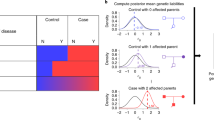Abstract
Most genetic studies recruit high risk families and the discoveries are based on non-random selected groups. We must consider the consequences of this ascertainment process in order to apply the results of genetic research to the general population. In previous reports, we developed a latent variable model to assess the familial aggregation and inheritability of ordinal-scaled diseases, and found a major gene component of alcoholism after applying the model to the data from the Yale family study of comorbidity of alcoholism and anxiety (YFSCAA). In this report, we examine the ascertainment effects on parameter estimates and correct potential bias in the latent variable model. The simulation studies for various ascertainment schemes suggest that our ascertainment adjustment is necessary and effective. We also find that the estimated effects are relatively unbiased for the particular ascertainment scheme used in the YFSCAA, which assures the validity of our earlier conclusion.
Similar content being viewed by others
References
Eiseman E, Haga S (1999) Handbook of human tissue sources: a national resource of human tissue samples. RAND Corporation, Michigan city, pp 79–82
Burton PR, Palmer LJ, Jacobs K, Keen KJ, Olson JM, Elston RC (2000) Ascertainment adjustment: where does it take us? Am J Hum Genet 67:1505–1514
Elston RC, Sobel E (1979) Sampling considerations in the gathering and analysis of pedigree data. Am J Hum Genet 31:62–69
Epstein MP, Lin X, Boehnke M (2002) Ascertainment-adjusted parameter estimates revisited. Am J Hum Genet 70:886–895
Ewens WJ, Shute NC (1986) A resolution of the ascertainment sampling problem. I. Theory. Theor Popul Biol 30:388–412
Merikangas KR, Stolar M, Stevens DE, Goulet J, Preisig M, Fenton B, Zhang HP, O’Malley S, Rounsaville BJ (1998) Familial transmission of substance use disorders. Arch Gen Psychiatry 55:973–979
Zhang HP, Feng R, Zhu H (2003) Latent variable model of segregation analysis for ordinal traits. J Am Stat Assoc 98:1023–1034
Feng R, Leckman J, Zhang H (2004) Linkage analysis of ordinal traits for pedigree data. Proc Natl Acad Sci 101(48):16739–16744
Chen H, Chen J, Kalbfleish J (2001) A modified likelihood ratio test for homogeneity in finite mixture models. J R Stat Soc B 63:19–29
Dempster AP, Laird NM, Rubin DB (1977) Maximum likelihood from incomplete data via the EM algorithm. J R Stat Soc B 39:1–38
Fisher RA (1934) The effects of methods of ascertainment upon the estimation of frequencies. Ann Eugen 6:13–25
Elston RC, Yelverton KC (1975) General models for segregation analysis. Am J Hum Genet 27:31–45
Bonney GE (1998) Ascertainment corrections based on smaller family units. Am J Hum Genet 63:1202–1215
Elston RC, Sobel E (1979) Sampling considerations in the gathering and analysis of pedigree data. Am J Hum Genet 31:62–69
Zhang HP, Merikangas K (2000) A frailty model of segregation analysis: understanding the familial transmission of alcoholism. Biometrics 56:815–823
Acknowledgement
This research is supported in part by grants K02DA017713 and R01DA016750 the National Institute on Drug Abuse.
Author information
Authors and Affiliations
Corresponding author
Rights and permissions
About this article
Cite this article
Feng, R., Zhang, H. Ascertainment adjustment in genetic studies of ordinal traits. Hum Genet 119, 429–435 (2006). https://doi.org/10.1007/s00439-006-0147-8
Received:
Accepted:
Published:
Issue Date:
DOI: https://doi.org/10.1007/s00439-006-0147-8




